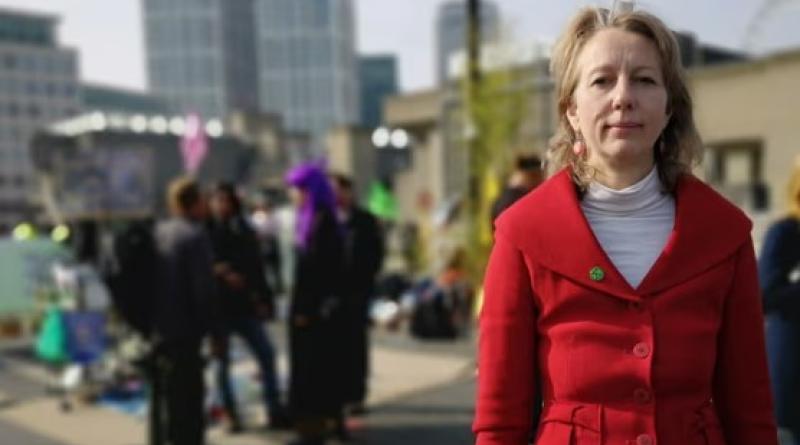Extinction Rebellion co-founder guilty of breaking window at HS2 protest

Dr Gail Bradbrook found guilty of criminal damage to Department for Transport building in 2019
The co-founder of Extinction Rebellion has been found guilty of criminal damage for breaking the window of a government department in a protest against the environmental impact of HS2.
Dr Gail Bradbrook was convicted on Wednesday by a jury after 45 minutes, after a two-day trial at Isleworth crown court.
The trial was held five years after Extinction Rebellion’s first acts of civil disobedience in London, when the group issued a declaration of rebellion in an effort to draw attention to the climate emergency.
Bradbrook said she felt “at peace” with the jury’s decision. “When you commit acts of civil disobedience you don’t have the hope or expectation to get off,” she said. “This is about doing the right thing.”
Bradbrook said she hoped the increasing criminalisation of climate protesters would draw attention to the “real climate criminals” supporting the production and use of fossil fuels that were a significant contributor to anthropogenic greenhouse gas emissions.
This was the second trial in this case. The first, held in July, was aborted after Bradbrook defied an order by the judge, Martin Edmunds, to stop speaking about her motivations.
Bradbrook was told that she must limit her evidence to what happened on the day she broke the window, and was ordered to submit her planned statement to the court for approval before the retrial.
During this second trial, Edmunds warned Bradbrook that not complying with his earlier rulings carried the risk of being charged with contempt of court.
“If your intention is to deliberately breach the restrictions that have been imposed by the law, then you know the consequences that might follow,” he said.
Kate Wilkinson, prosecuting, told the court Bradbrook used a hammer and chisel to break a window at the Department for Transport building in London on 15 October 2019, causing £27,660-worth of damage.
She said there was no lawful excuse for this action. “Even if you admire this defendant, even if you share her beliefs and are just as worried about the environmental damage as she is … your duty which you just swore to carry out is to reach a verdict according to the evidence, not according to your sympathies.”
Edmunds said the case was not about the principles of the climate crisis but about breaking a window. “It’s not the place for a public demonstration of your views,” he told Bradbrook.
Bradbrook maintained that when she broke the window she believed she would be able to argue that she had acted out of necessity, a defence that activists often try to use in court. However, the jury was told such a defence had been explicitly denied to protesters in recent legal decisions.
Despite being curtailed repeatedly by the judge, Bradbrook told the jury she felt she had to tell the “whole truth” in order to have a fair trial and to be consistent with her sworn oath of honesty.
Bradbrook did not dispute that she broke the window but maintained that she was not a criminal. Representing herself in court, she stressed that the action was peaceful and said she took care that no one was harmed.
“I’m not a lawyer but I am a mother, a mother of two boys, and I’m also a trained scientist,” she said. “And I’m also a person who cares very deeply about justice and about life on Earth. I care that life continues and that my children have a future.”
She described rising awareness and concern of the climate and ecological emergencies when her two sons were very young: “As a mother, we’ve got two main duties: one is that we have to keep our children safe and the second is that we have to give them a future.”
Bradbrook told the jury she was moved to pursue civil disobedience after repeatedly emailing her MP and having done “all the marching and petitions”.
She described growing public concern about the environmental crisis, the declaration of a climate emergency by parliament and the former prime minister Theresa May’s setting of a net zero target in the year after Extinction Rebellion was founded.
“Civil disobedience is necessary, proportionate and effective in making change,” she told the jury.
Bradbrook also said she was vindicated by the recent government announcement that HS2 would be scaled back, which meant a woodland she frequented as a child was safe, as well as recent revelations by the Times of alleged fraud in the project.
“I have no regret about taking the action, although I was surprised by the cost of the damage and wish it could have been less,” she said.
Bradbrook has been released on bail, pending a sentencing hearing in December.
Photograph: Lewis Pennock/PA - Dr Gail Bradbrook said she felt at peace with the jury’s decision.






